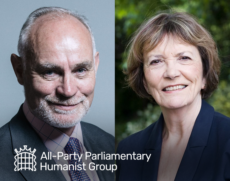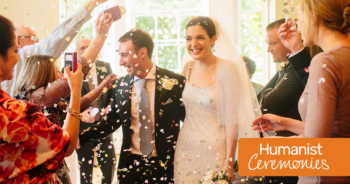 In a new report published today All Party Parliamentary Humanist Group (APPHG) Co-Chairs Crispin Blunt MP and Baroness (Joan) Bakewell have called for legal recognition to be extended to humanist marriages in England and Wales. The report follows an inquiry of the Group conducted over the last three months, into the barriers to such recognition, and proposes solutions to Government for all those barriers.
In a new report published today All Party Parliamentary Humanist Group (APPHG) Co-Chairs Crispin Blunt MP and Baroness (Joan) Bakewell have called for legal recognition to be extended to humanist marriages in England and Wales. The report follows an inquiry of the Group conducted over the last three months, into the barriers to such recognition, and proposes solutions to Government for all those barriers.
A humanist wedding is a non-religious ceremony that is deeply personal and conducted by a humanist celebrant. It differs from a civil wedding in that it is entirely hand-crafted and reflective of the beliefs and values of the couple, conducted by a celebrant who shares their beliefs and values, and can take place in any venue that is special to them. In Scotland, humanist weddings are recognised as legal marriages but in England and Wales Government commitments to extend legal recognition were recently abandoned.
The report examines two previous reviews into the matter, conducted by the Ministry of Justice and the Law Commission, to consider any concerns they had about extending recognition. In their foreword, Mr Blunt and Baroness Bakewell write that:
‘Our exercise has led us to conclude that [these reviews] both ignored two crucial matters: firstly the human rights case for reform; secondly, a more technical point about multiple Orders that nonetheless significantly deals with the bulk of the concerns raised. Our inquiry has also led us to realise that the present system, whereby couples having a humanist wedding ceremony must have a separate civil marriage in order to gain legal recognition, can put such couples at a serious disadvantage, financially and practically, in terms of their ability to have the wedding they want.
‘In light of our findings, we think the concerns set out by the official reviews are largely dealt with. Marriage law is extremely complex and may call for wider reform, but we don’t think any need for wider reform remotely justifies continuing delay in granting recognition to humanist marriages.’
 The main recommendation of the report is consequently: ‘We urge the Government to lay an Order… for legal recognition of marriages conducted by Humanists UK.’
The main recommendation of the report is consequently: ‘We urge the Government to lay an Order… for legal recognition of marriages conducted by Humanists UK.’
On publication of the report, Crispin Blunt and Baroness Bakewell commented, ‘It has been five years since humanist marriages in England and Wales found their way onto the statute books, through the Same-Sex Marriage Act, but the Government still has chosen not to enact the relevant provisions and make them happen. Humanist wedding ceremonies are already very popular in England and Wales, and this is even more true in Scotland where they have had legal recognition for over a decade.
‘Our inquiry has led us to conclude that the human rights case for such reform is overwhelming. Given these facts it is far past time the Government enacts legal recognition. We can see no reason for continuing delay.’
Notes
For further comment or information, please contact Humanists UK Director of Public Affairs and Policy Richy Thompson on richy@humanists.uk or 020 3675 0959.
Read the report, ‘Any Lawful Impediment?’ A report of the All-Party Parliamentary Humanist Group’s inquiry into the legal recognition of humanist marriage in England and Wales: https://humanists.uk/wp-content/uploads/APPHG-report-on-humanist-marriage.pdf
Recognition of humanist marriages around the UK, Ireland, and crown dependencies:
- Legal recognition of humanist marriages has already had a transformative effect on Scottish and Irish society. In Scotland, humanist marriages gained legal recognition in 2005, and have risen in number from 85 in the first year to over 4,900 in 2016.
- In the Republic of Ireland, humanist marriages gained legal recognition in 2012. In 2016 around seven percent of legal marriages were humanist, more than four times as many as there were (Protestant) Church of Ireland marriages.
- Jersey extended legal recognition to humanist marriages in February, as part of new legislation. Guernsey is also currently considering legal recognition of humanist marriages, as part of a similar more recent review of marriage law.
- In Northern Ireland, Humanists UK and its section Northern Ireland Humanists have been working through the courts to secure recognition of humanist marriages alongside public speaker Laura Lacole and footballer Eunan O’Kane. A High Court decision granted initial legal recognition to humanist marriages but this has been stayed as it was subsequently appealed by the Government. The Court of Appeal finished hearing the appeal in early January. Its decision is expected soon.
- In England and Wales, since 2013 the UK Government has had the power to extend legal recognition if it wishes, but hasn’t chosen to use this power yet. Nonetheless, over 1,000 humanist wedding ceremonies are now taking place each year – meaning that Humanists UK celebrants are only being outnumbered by civil marriages, the Church of England, the Catholic Church, the Church in Wales, and the Methodist Church.
Read more about Humanists UK’s campaigns around marriage laws: https://humanists.uk/campaigns/human-rights-and-equality/marriage-laws/
At Humanists UK, we advance free thinking and promote humanism to create a tolerant society where rational thinking and kindness prevail. Our work brings non-religious people together to develop their own views, helping people be happier and more fulfilled in the one life we have. Through our ceremonies, education services, and community and campaigning work, we strive to create a fair and equal society for all.
